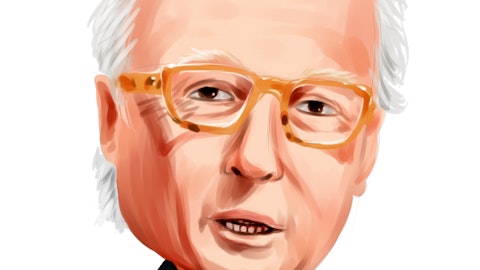Operator: The next question now comes from Mauricio, sell-side analyst from Credit Suisse.
Mauricio Cepeda: Thank you taking Carlos. This is Cepeda from Credit Suisse. edX reported yesterday results. So I think there are things that we asked then that we should ask you because first of all, congratulations on the results and the clarity of the presentation. One of the things that was discussed with then and I think it’s a fair point to ask you as well is about all these commercial dynamics to attract first year students, all the commercial dynamics to have more intakes. So I ask you a little bit about the necessity to in a certain way, subsidize this first year students so that you can have intake and then let’s say try to retain them even with all the subsidies throughout time. You mentioned that says UniCesumar had a period where the tickets were still were a little bit lower.
And now there has been a recovery of tickets in UniCesumar. So, my question would be okay, if you keep this kind of policy, which kind of policy how aggressive the market in terms of prices, so that you can obtain more or less growth in this first year? And the second question would be about CS, I know, it’s kind of a tricky discussion, because there is nothing concrete about that, but what is the sector discussing with the working group there about inclusion of distance learning in a future program design, thank you.
Carlos Freitas: Hi, Cepeda. So, regarding the market and prices in intake et cetera, I mean, what we are seeing in this current intake cycle, which was already saw also just extend last year was a more is and was a more rational market I mean competition is here is here is fierce, it has always been. We are operating in a competitive environment. It is as tough this year as it was last year as it was in ’21. It is a tough market in which you have to have differentiation, we have to have high quality, you must have delivery. So, but anyway what we are seeing the last, didn’t take in the last year I mean the last 12 months more or less is a more rational environment. I mean rationally is a strange word, I’ll say a less players with more with too aggressive strategies.
So, in the end, a sector that is actually I’d say operating in a very competitive environment, but in a more say disciplined approach with some differences for region for products. It is in some case with some changes over time with some players start to be less aggressive and then more aggressive at the end it changed from player to player from region to region but overall, it is a competitive environment in which we keep gaining market share with a disciplined tickets. So we don’t want to grow for the sake of growing, we are growing, operating in a market that is growing and we are delivering what we believe to be a high quality product. And we keep gaining market share. So this is not, we don’t see today a more competitive market than what we saw in €˜22 or ’21 or €˜20.
And for CS, I mean, that’s the million dollar question or billion dollar question. We, our opinion is the following. When CS was created, distant learning or digital education was the exception. Now it is the norm. So now when we see that more than two thirds of the new students are deciding to roll in digital education courses instead of on-campus. So one third of the newcomers is going to on-campus, two thirds to digital, the norm is the standard decision, the base case decision now is to go to digital education. So in our opinion, a potential new version of CS or any other name, will include distant learning, for sure, we do not believe in possibility only for on- campus, it is not impossible. We do believe it is unlikely. We mean, and also from a purely economic perspective, when we see, I’d say the efficiency of capital allocation, it is more efficient also to allocate capital to impact more people, especially people that need education, and that also part of the overall base of the current administration.
We do believe that in case there is new CS, it will include on-campus and digital education. And also because today there’s more gray areas than the past. It is today, education is becoming more and more hybrid, than what we thought 10 years ago. So the short answer is that we don’t know. But we do believe that if there is something it will be for the overall sector.
Operator: The Q&A session is closed. And now we would like to turn the floor over to the company’s closing remark. So Mr. Carlos Freitas. Please make your final remarks and close the call.
Carlos Freitas: So thank you all. Thanks for following Vitru, thanks for your interest. And we keep open for any final questions that you may have. Thank you. Goodnight.
Operator: The video conference of results referring to Vitru’s fourth quarter and full year 2022 is closed. The Investor Relations Department is available to answer other questions and concerns. Thanks so much to the participants and have a good evening.
Follow Vitru Ltd (NASDAQ:VTRU)
Follow Vitru Ltd (NASDAQ:VTRU)
Receive real-time insider trading and news alerts

